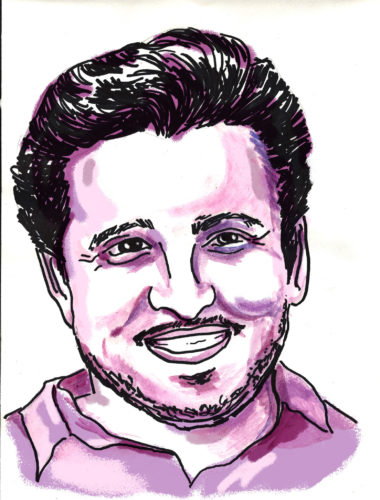The energy in the auditorium at Benito Juarez High School in Pilsen on March 20 was charged and heated, at times feeling closer to a pep rally than a political debate. Neighborhood residents and members of various community organizations had packed in to hear the two runoff candidates for 25th Ward alderman, Byron Sigcho-Lopez and Alex Acevedo, present their visions for the next four years of ward leadership.
Despite a “no heckling” rule, and several reminders from WGN’s Lourdes Duarte, the moderator, both candidate’s base of supporters was amped up, jeering and shouting out at the opposing candidate, and applauding effusively when their own spoke.
Remarkably, disgraced 25th Ward Alderman Danny Solís was only mentioned a few times by name, as Duarte tried to steer the conversations toward various ward issues. Solís’s much-chronicled involvement in an FBI investigation, which is targeting some of the Chicago Democratic machine’s most notorious power brokers, dominated the discourse of the general aldermanic election in the ward on February 26.
But as the tick-tock reporting of the scandal surrounding Solís has largely faded from the headlines and campaign trail in the ward, it’s quickly been replaced by allegations of voter fraud and ballot theft, alleged “intimidatory” campaign tactics, and a general climate of contention and disdain between the candidates. At last week’s debate, the tension—buoyed by raucous supporters on both sides—was palpable, a snapshot of the vitriolic tenor both candidates have struck on the campaign trail.
It’s that atmosphere which former aldermanic candidate Hilario Dominguez, who came in third on February 26, says has become a serious distraction from substantive debates on ward issues—one that he admits his own campaign could have been better about, too.
“[We need to] start moving away from the divisive politics and the toxic politics, the type of campaigning that historically we’ve had in the ward, and to start demanding better campaigning, start demanding that candidates stick to issues, talk about issues, and don’t bring in personal attacks,” he said. “If we want better candidates, if we want better politics, then we have to demand it, and that means we have to move beyond our historically toxic culture.”
The heavily gerrymandered 25th Ward runs a diverse range of neighborhoods on Chicago’s Lower West Side, stretching from the northeastern corner of McKinley Park through most of Pilsen and part of the West Loop, before sloping down to encompass a stretch of the South Loop and most of Chinatown.
In some ways, Sigcho-Lopez and Acevedo represent caricatures of the opposite ends of Pilsen’s political spectrum: a socialist immigrant community organizer going up against a lifelong neighborhood resident with family ties to the Democratic machine. As the Weekly has previously reported, both candidates’ power bases lie in distinct organizations and longtime affiliations, each with deep and at times divisive histories in the 25th Ward.

Before going on leave and launching his campaign, Sigcho-Lopez was the director of the Pilsen Alliance, an anti-gentrification community organization that has organized around housing justice, education, and other progressive issues. Under Sigcho-Lopez’s leadership, Pilsen Alliance developed a citywide reputation, aligning themselves with causes like Lift The Ban Coalition, which hopes to overturn a state law prohibiting rent control, and the #NoCopAcademy movement.
They’ve also been one of the most vocal anti-Solís voices in Pilsen for many years, challenging the alderman’s relationship with property developers, which they say has sped up widespread displacement in the neighborhood. Development and displacement have been defining issues in the race, not only in Pilsen, but Chinatown, the West Loop, and throughout the ward.
On the campaign trail, Sigcho-Lopez often calls for greater accountability and transparency in City Hall, and has pledged to dismantle the Pilsen Land Use Committee (PLUC), a closed-doors council that advises the alderman on development projects. He’s made sustainable development the central pillar of his campaign, and is supportive of rent control and community-driven zoning, a process which allows anyone from the community be involved (much like participatory budgeting, another one of his policy platforms).
“We in the 25th Ward do not have an issue of bringing resources [to the Ward]. Resources are coming in, there’s a lot of projects, there’s a lot of development, but it’s not benefitting the residents,” Sigcho-Lopez said at Wednesday’s debate. “Many small businesses have seen their doors close. So we have to make sure that development is also helping the residents and small businesses. Who will make that a priority? To make sure that we sign community benefits agreements, that create affordable housing, that create local employment…the main thing is sustainable development, to make sure that every project is vetted by the residents.”

Acevedo has promised similar transparency in his platform—which he described in a Weekly interview before the election as consisting of support for homeowners, resident engagement in public safety, and environmentally-friendly development—but many of his familial and institutional ties, like his endorsements from the FOP and the charter school lobby and work with a neighborhood watch group that works with police, have left critics wondering how much he intends to follow through on his more progressive proposals.
At the debate, Sigcho-Lopez ended up circling almost all of his answers back to the issue of equitable development, speaking broadly while mostly shying away from specific solutions and ideas. He also repeatedly brought up Acevedo’s ties to developers, who have heavily supported his campaign.
“During twenty-three years, [Solís] took massive amounts of money from developers. So that’s a key problem here…In order to for us to bring resources to the 25th Ward, we cannot accept a penny from developers.”
Acevedo’s public relationship with development interests has been inconsistent. At a forum in late January, Acevedo agreed to a pledge proposed by Sigcho-Lopez not to take campaign contributions from developers. It’s unclear what exactly Acevedo’s thinking here was; throughout his campaign, he’s received tens of thousands of dollars from developers and other groups with a stake in the 25th Ward’s hot development market, including realtors, property management firms, construction firms, trade unions, and the Mexican American PAC, which is partially funded by developers and 14th Ward Alderman Ed Burke. (He’s also received $1,500 between 2016 and last month from the treasurer of that PAC, Phil Fuentes, under the nom de plume “Hamburger Seller”—likely a reference to his occupation as the owner of several McDonald’s franchises, and, given the fact that there are no companies registered under that name in Illinois, a potential campaign finance reporting violation, according to Reform for Illinois. Fuentes did not respond to media requests for comment.)
Additionally, his proposals for transparency around development—keeping the existing PLUC but expanding it to longtime residents, a ban on accepting money from developers that receive TIF funding, and a forty-eight-month ban on donations from developers seeking a zoning change in the ward—are markedly selective and potentially difficult to implement. (His campaign didn’t respond to Weekly requests for comment.)
“It’s not the fact that you’re just taking money from developers, because I clearly took money from real estate agents,” Aida Flores, who came in fourth in the first round, said in an interview. “It’s the fact that you’re not owning up to it.”
Acevedo tried to dodge the association at the Benito Juarez debate, saying, “Our campaign is a coalition of multiple contributions, from minority-owned businesses, to small businesses, from entrepreneurs from this community. We don’t have PACs giving $50,000, we don’t have wives giving $90,000.”
That’s a dig against Sigcho-Lopez, who has received significant donations from traditionally liberal special interest groups. So far, he’s accepted $27,500 from the Chicago Teachers Union and approximately $50,000 from two local SEIU PACS. He’s also received $80,000 in donations and loans from his wife, Loreen Targos, and more from her family.
And while Sigcho-Lopez has publicly railed against corruption and back room decision-making in the 25th Ward, the last month has brought serious allegations of ballot theft and voter fraud against his campaign.
In mid-February, Hilario Dominguez and state Representative Theresa Mah accused Sigcho-Lopez supporters of stealing mail ballots from seniors in an apartment complex in Chinatown. Then, on election day, the Chicago Lawyers’ Committee for Civil Rights said that voters at affordable housing development Barbara Jean Wright Courts, near the University of Illinois at Chicago, were promised gift cards if they voted for Sigcho-Lopez. The Illinois Attorney General and Cook County State’s Attorney’s office are investigating the claims, but neither confirmed whether any findings would be released before the runoff election on April 2.
In both instances, Sigcho-Lopez has denied any wrongdoing and dismissed the allegations as “desperate eleventh hour attempt[s] to mislead and distract the voters.”
Both situations were strangely reminiscent of the 2015 aldermanic election, when then first-time challenger Sigcho-Lopez was the one accusing incumbent Solís of manipulating mail-in ballots, vote buying, and vote manipulation at locations that also included the Barbara Jean Wright Courts Apartments and senior apartments in Chinatown.
The allegations have become an outsized issue in the race. That’s been partially fueled by the Acevedo campaign, which has dubbed Sigcho-Lopez “Buyin’ Byron” in recent campaign mailers. At a press conference on March 11 outside of the Barbara Jean Courts, Acevedo continued the attack, saying the gift card exchange was “a highly coordinated attack on voting rights by the Sigcho-Lopez campaign.”
On Friday, the Hispanic Lawyers Association of Illinois and the Puerto Rican Bar Association of Illinois announced they would send at least twenty lawyers to act as poll watchers in the 25th Ward during the April 2nd election. The president of the HLAI, Juan Morado, is also the co-chairman of the Latino Leadership Council, a PAC started last year by, among others, U.S. Representative Jesús “Chuy” García and Solís. He also served as the campaign manager for 30th Ward Alderman Ariel Reboyras’s first reelection campaign in 2007. Reboyras was first elected with the support of the now-defunct Hispanic Democratic Organization, a corrupt political arm of the Richard M. Daley administration that also supported the political rise of Eddie Acevedo, Alex’s father.
David Wu, the executive director of the Pui Tak Center in Chinatown, told the Weekly after a candidate forum last week at the center that residents had expressed concern over the nature of the allegations, some of which involved taking advantage of vulnerable seniors in Chinatown, who are also a difficult group to get out to vote. But Angela Lin, community outreach coordinator for Coalition for a Better Chinese American Community (CBCAC), still didn’t think the investigation would galvanize Chinatown voters for the runoff.
Lin said that seniors make up a large portion of Chinatown’s eligible voters, but those same seniors are often only able to read local Chinese language news outlets where the allegations weren’t covered in depth. “Most detailed articles about the allegations are covered in English, so it may not affect voters and residents with limited English proficiency who do not know about the incidents,” said Lin.
Whether the allegations are true, Sigcho-Lopez resoundingly won both precincts on February 26 where the alleged misconduct took place—as he did most of Chinatown, despite Mah’s endorsement of Dominguez. Mah, who was elected to be the first Asian-American in the state legislature in 2016, has contentious relationships with both candidates. Sigcho-Lopez has regularly criticized her for a perceived alliance with Solís, and the campaign between Mah and Acevedo for the state House seat became particularly nasty by the end. Still, Mah expressed willingness to work with the winner of the election. “I’m willing to work with whoever is elected into that office,” said Mah, “It would be a deal for my constituents if we could all work together and get things done for them.”
It may eventually not matter as much whom Mah is aligned with in a few years; at the Pui Tak Center forum, both Acevedo and Sigcho-Lopez advocated for the creation of a majority-Chinese ward based in Chinatown, an issue community groups have been organizing around for years in the historically underrepresented and politically fragmented neighborhood.
In the weeks since the election on February 26, Acevedo’s campaign has moved to the left, incorporating policies that a month ago would have seemed more in line with Sigcho-Lopez’s platform, including his proposals around campaign donations and developers.
Part of the Acevedo’s shift is no doubt due to the large chunk of votes still up for grabs. Together, Acevedo and Sigcho-Lopez received just over half of the votes cast in the February 26 election. That leaves a huge percentage of unaffiliated residents who initially supported Hilario Dominguez, Aida Flores, or Troy Hernandez. Now, a week before the election, it’s unclear where those voters are going to go; at the time of this article’s publication, none of the three former candidates have endorsed Sigcho-Lopez or Acevedo.
“People are confused, I think voters in general, maybe voters that voted for myself, Aida or Troy, are just trying to figure out where to go next,” Dominguez said in an interview. “I think a lot of people are listening to hear what I have to say, and… it’s [to] listen carefully on issues, see where they stand, challenge candidates on how exactly they’re going to do things…The bar is too low in the 25th Ward.”
Aida Flores, the only woman who ran in the general election, echoed Dominguez’s call for focusing on the issues and holding the runoff candidates accountable. And while Flores has declined to make an endorsement, she’s made it clear she won’t be supporting Acevedo.
In a statement shared on social media in early March, Flores accused the Acevedo campaign of lodging an “ugly and sustained whispering campaign against me and my loved ones and intimidatory tactics utilized against my supporters.”
“I don’t think our values and processes match,” Flores said in a later interview, expressing concerns about his campaign’s conduct. “I had volunteers that some of [Acevedo’s] supporters were hostile towards, and that was inappropriate…at the polling place, you know, ‘who is she,’ ‘who does she think she is running for office,’ things like that or, you know, talking to my family and saying, ‘she should drop out of the race because she’s inexperienced.’”
At the press conference on March 11, Acevedo said Flores’s allegations were “false, absolutely false.”
Troy Hernandez came in last on February 26, receiving 835 votes, or 8.46 percent of total votes cast. Throughout the race, Hernandez said he would not support either Sigcho-Lopez and Acevedo.
“They’re both machine campaigns,” he said in an interview this week, calling Sigcho-Lopez a “fake progressive” and criticizing Acevedo’s family history. “I’m personally annoyed and frustrated by Byron, but I wouldn’t go against his campaign just out of a personal thing. I think he’s a dangerous person to give power to.”
Hernandez says he will likely end up voting for Acevedo, but doesn’t plan to endorse him.
As each campaign doubles down ahead of next week’s runoff, it’s unclear just how much the baggage of the race will sway 25th Ward residents.
Will voters, still outraged at the lingering corruption scandal involving Solís, identify with Sigcho-Lopez’s sweeping, idealistic rhetoric? Or will they be attracted to Acevedo’s specific, if at times unworkable, policies? Or they may be more concerned with receiving consistent services that an alderman can facilitate—like garbage pickup or filled potholes.
Additional reporting by Sam Stecklow and Tammy Xu
Quinn Myers is a freelance radio and print journalist based in Chicago.

